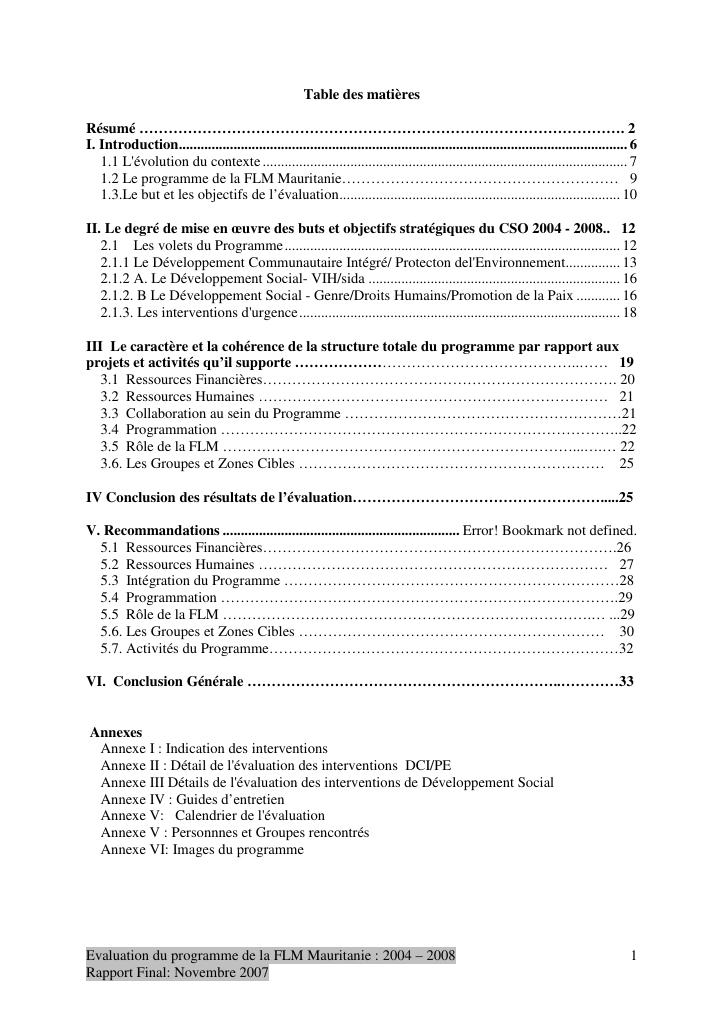Evaluering
Evaluation of LWF Mauritania programme (2004-2008)
Background: The FLM programme developed from a group of emergency aid and environmental protection activities that began in 1974. After several changes of location concerning its coordinating offices outside the capital, the programme now addresses five zones identified as being among the poorest by CSLP for the country. These zones are Trarza, Gorgol, Brakna and the two Hodhs (map on page 12 of this evaluation). More recent activities concerning social development were born in the capital and developed there and in other urban and rural zones. Purpose/ Objective: The purpose of the evaluation was both retrospective and looking to the future.• Evaluate to what degree the goals and strategic objectives from the CSO 2004-2008 in LWF, Mauritania have been obtained• Evaluate the continuity and coherence of the actual CSO in a changing context and how progress ahs been realized, and give recommendations for LWF to consider when they elaborate a new strategic plan after 2008. Methodology: The five external evaluators have received all necessary documentation electronically beforehand. One preparatory meeting has been held before the evaluation started. The evaluation has split into two teams that have visited different parts of Mauritania.Participative methodology has been used in the evaluation. Key Findings: The evaluation notes that the overall programme was ambitious. It was able to generate funds to support apart of its ambitions but the level of costs was high. Certain problems spring from this fact: To face the fact that the programme didn't have the means to implement all its ambitions, the PMD was down-sized, designing annual action plans based on a Working Budget which took into account declared funding commitments; Programmed integration of DCI/PE and DS services was not articulated coherently and internal problems led to a lack of collaboration between the two parts of the programme, without arriving at a dialogue to resolve this problem ; The dispersion of DCI/PE and DS activities to points with some 1.500 km apart resulted in a lessening of the programme's impact ; The opportunity was missed to bring about synergy of community development and social development, and to encourage greater empowerment of participants; Emergency activities have diminished since 2006, leaving FLM without significant means of rapid reaction in the event of need for emergency aid (for instance the very modest response during floods at Tintâne in August 2007); Despite training on the Rights Based Approach to development, programme personnel do not seem to have completely assimilated this vision in application to their work. Recommendations: The evaluation's main recommendation is that there is still a need in Mauritania for the type of programme provided by the FLM and that as a result it is reasonable to look forward to its continuation. The question is what form it can take to use available funding to best effect. • A new look at the expenditure of a future programme.The frames of the programme in Mauritania advocate a considerable increase in funding in order to rationalise its current structure, and it is to be hoped that they will be successful in finding donors needed to achieve this goal.• In looking at long term development, the evaluation team recommends setting up an open dialogue between the personnel in Nouakchott, local management and FLM headquarters in Geneva concerning an idea mentioned several times by the Personnel that FLM Mauritania should become a national structure benefiting from the means currently managed by the country management. We have the impression that this prospect has been discussed for some time by the Mauritanian personnel which needs to know what the conditions would be for this to materialize. This kind of project would call for a long period of reflection on both sides.• Giving the programme's human resources full latitude to show its worthIt is important to implement fully all the possibilities for strengthening the capacities of the personnel.• Integrasjon of programme themes.We strongly recommend promoting FLM Mauritania's spearhead activities in programming mainstreaming of the themes of the two components of social development with DCI/PE/Emergency activities in the regions, targeting continuous training for field staff and networks through initiation to preparation of action plans, monitoring and sensitization plans• Programming. The integrated nature of the programme will be reflected throughout the PSE process.• Redefinition of FLM's role.The global strategy of the FLM is facilitation, integration and the rights based approach, so the programme by its nature will always be that of an operational stakeholder, but may also achieve this through national NGOs. FLM will therefore increased its added value as an agent of capacity building for local stakeholders, a role which is not generalised among many other international NGOs (whose presence in Mauritania is not strong)• A reconfiguration of target beneficiaries and zones of programme intervention Comments from Norwegian Church Aid (if any): • A work shop for a new CSO for 2008 to 2012 has been held in Noackchott in September 2008. LWF is at present elaborating a new strategy plan taking into consideration the results given in the evaluation.
